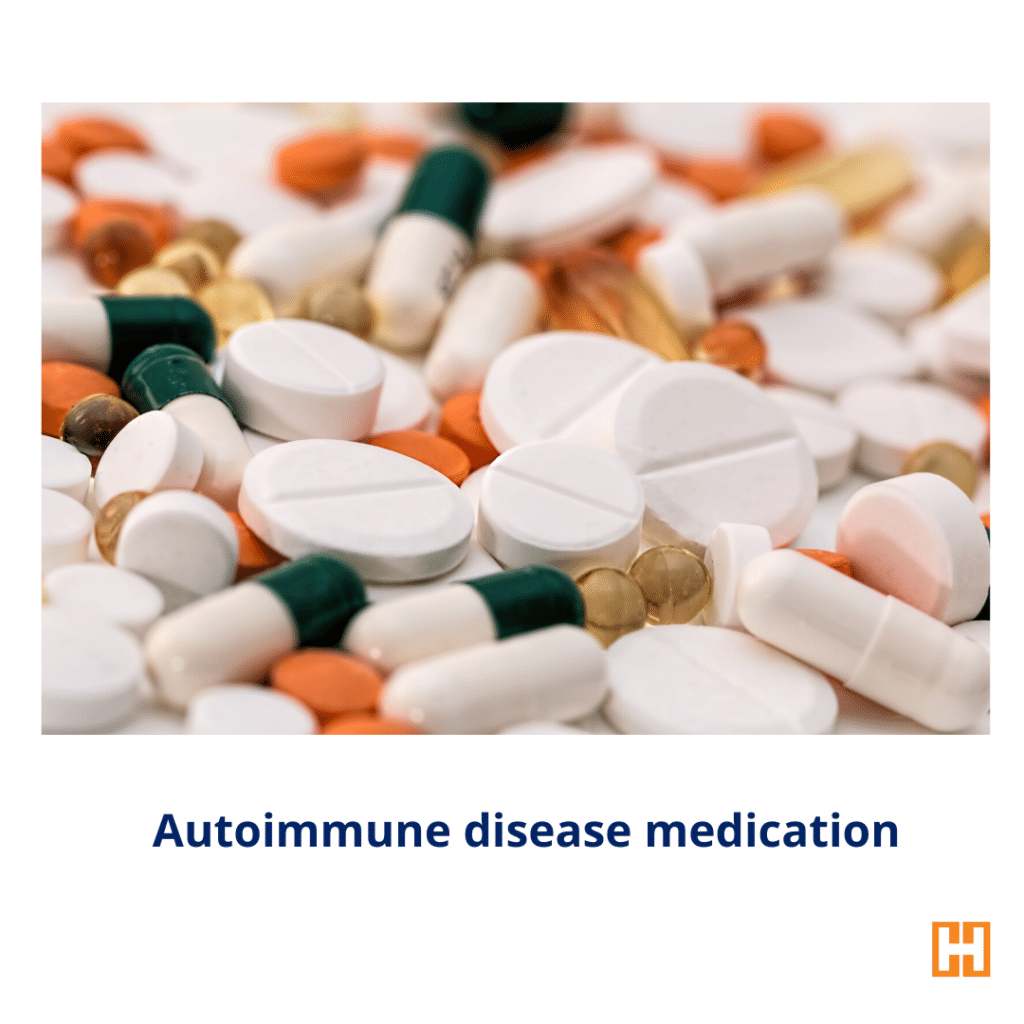
In the management of autoimmune diseases, doctors aim to induce patient’s improvement, whether by remission or low disease activity. Although the definitive cure and the restoration of immune tolerance are ideal, most of the existing treatments currently do not achieve these goals, and they bring a range of side effects. Therefore, it is important to review the therapies currently used to control these diseases, emphasizing their main characteristics and impact on patient’s health.
NONSPECIFIC ANTIINFLAMMATORY DRUGS
Are divided into two types, Nonsteroidal anti-inflammatory drugs (NSAIDs) and Glucocorticoids. NSAIDs are widely used in the world, they act by blocking the activity of cyclooxygenase, which in turn inhibits the formation of prostaglandins (this substance plays a role in inflammation, inducing swelling, erythema, and changes in vascular permeability). NSAIDs are extensively used in multisystem autoimmune diseases to treat symptoms such as fever, arthritis, serositis, and headache. It is not recommended for continuous use, due to its potential side effects such as dyspepsia, peptic ulcer (usually with bleeding), renal vasoconstriction with acute kidney injury, aggravation of hypertension and heart failure, with an increased risk of a heart attack. Ibuprofen, aspirin, and diclofenac are some examples of medications. Glucocorticoids have a variety of anti-inflammatory and immunosuppressive effects. They are often used to control acute manifestations of inflammation and autoimmune disorders. However, if used in high doses or for a long period of time, they might trigger some side effects such as infection, mental disorders, osteonecrosis, osteoporosis with fractures, increased glucose intolerance, peptic ulcer, myopathy, glaucoma, and hypertension. Weight gain is considered a common side effect, even with a low dose of medication. Prednisone, methylprednisolone, cortisone, and hydrocortisone are some examples of medications.
DISEASE-MODIFYING ANTIRHEUMATIC DRUGS (DMARDS)
Possessing immunosuppressive effects, these drugs are designed to delay the damage caused in the joints by rheumatic diseases and can also induce or maintain the remission of the disease. They are divided into conventional and biological therapies. Conventional therapies have a slow action and may take several weeks to take effect, in this group include methotrexate, hydroxychloroquine, leflunomide, sulfasalazine, minocycline. Despite being widely prescribed, they can cause a rash, stomach upset, diarrhea, eye problems (hydroxychloroquine). Biological therapies are molecules with biological origin (antibodies or receptor proteins), which have been applied in the recent years. They can be classified according to their mechanisms of action: Cytokine-targeted therapies, B-cell-targeted therapies, and T-cell-targeted therapies. The first type acts inhibiting the production of some cytokines (cells involved in the inflammatory process), reducing inflammation (e.g. TNF inhibitors). TNF-inhibitors use monoclonal antibodies (mABs) or TNF-binding fusion proteins to neutralize and block various proteins in autoimmune disease processes. They can be administered into the patient intravenously or subcutaneously. TNF inhibitors are indicated for rheumatoid arthritis, psoriatic arthritis, ankylosing spondylitis, plaque psoriasis, juvenile idiopathic arthritis, Crohn’s disease, and ulcerative colitis. Depending on the pathology, it can be used in conjunction with another conventional DMARD, such as MTX. B-cell-targeted therapies, interact in the production factors of B lymphocytes inhibiting the production of autoantibodies (antibodies that attack the body’s cells). Ex: Rituximab and Belimumab (indicated for systemic lupus erythematosus – SLE). T-cell-targeted therapies work by interfering with T cell activation, resulting in a decrease of pro-inflammatory cytokines production. Abatacept is an example of T-cell-targeted therapy, which is considered safe and effective in the treatment of rheumatoid arthritis.
Although the existing biological therapies are more selective, they may cause serious adverse events, such as neutropenia, leukopenia, infections, malignancies, among others. Thus, it is important to adopt measures that also will help the patient during the treatment of the disease, such as practicing physical exercises, good sleep management, reducing stress. A study showed that a group of people who had stress disorders had a 36% greater chance of developing psoriasis, rheumatoid arthritis, celiac and Crohn’s disease than the group of people who did not present stress disorders. Besides, it is important to manage the environmental factors that can trigger certain autoimmune diseases such as exposure to UV light and smoking. The UV light in patients with SLE can stimulate an inflammatory response and the production of autoantibodies, leading to photosensitivity, cutaneous SLE, and/or generalized seizure. Regarding smoking, in addition to triggering the disease process, it can increase the severity of the symptoms of a person who already has an inflammatory disease.
Do you take medication for your autoimmune condition? If experiencing any side effects how you are dealing with them?
References:
GRIGOR, C., CAPELL, H., STIRLING, A., MCMAHON, A.D., LOCK, P., VALLANCE, R., et al. Effect of a treatment strategy of tight control for rheumatoid arthritis (the TICORA study): a single-blind randomized controlled trial. Lancet, 364 (9430), p.263-269, 2004.
LI, P.; Zheng, Y.; Chen, X. Drugs for Autoimmune Inflammatory Diseases: From Small Molecule Compounds to Anti-TNF Biologics. Front Pharmacol., v8, 2017.
SONG, H.; FANG, F.; TOMASSON, G.; et al. Association of Stress-Related Disorders with Subsequent Autoimmune Disease. American Medical Association, v319(23), 2018.
TIONG, B.K.; HAHN, B.H.; AUNG, T. Treatment of Autoimmune Disease: Established Therapies. The Autoimmune Diseases (Sixth Edition), p. 1415-1436, 2020.
Blog writer: Vanessa Perdigao















